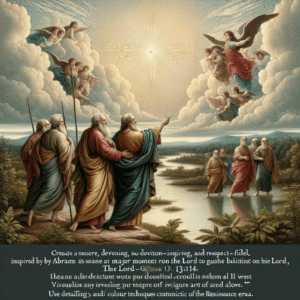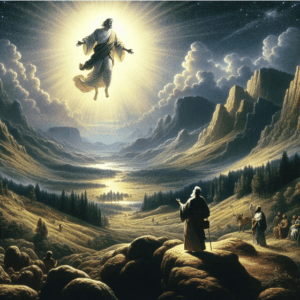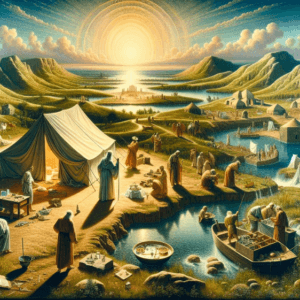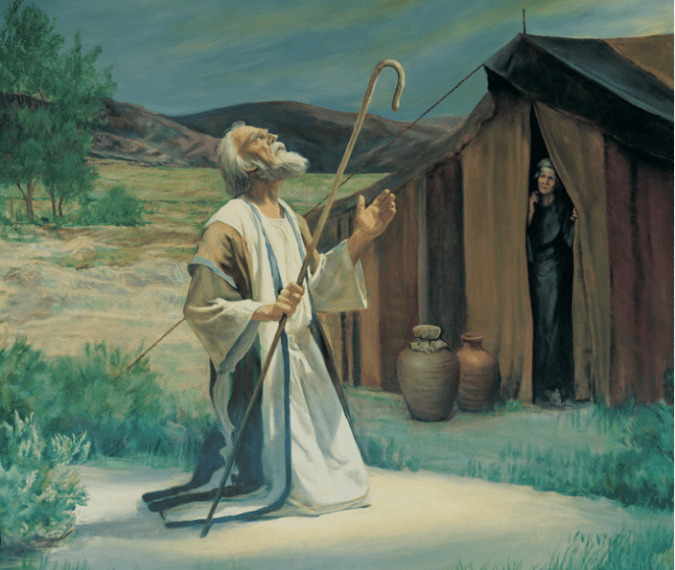GOD APPEARS TO ABRAHAM AND REAFFIRMS HIS PROMISE
“And the Lord said unto Abram, after that Lot was separated from him” —here is the third appearance of God to this man.
“Lift up now thine eyes, and look from the place where thou art northward, and southward, and eastward, and westward.” This is the land God is going to give him.
As God continued to appear to Abram and later on to the other patriarchs, God put sideboards around that land.
In other words, He put a border to it and told them exactly what the land was. He was very specific about it.
Genesis 13:14-18 KJV
[14] And the LORD said unto Abram, after that Lot was separated from him, Lift up now thine eyes, and look from the place where thou art northward, and southward, and eastward, and westward:
[15] For all the land which thou seest, to thee will I give it, and to thy seed for ever.
[16] And I will make thy seed as the dust of the earth: so that if a man can number the dust of the earth, then shall thy seed also be numbered.
[17] Arise, walk through the land in the length of it and in the breadth of it; for I will give it unto thee.
[18] Then Abram removed his tent, and came and dwelt in the plain of Mamre, which is in Hebron, and built there an altar unto the LORD.
Genesis 13:14
And the LORD said unto Abram, after that Lot was separated from him, Lift up now thine eyes, and look from the place where thou art northward, and southward, and eastward, and westward:
 Directly Lot departs, God draws near to Abraham. The Lord tells Abraham that the Promises are given to him, and not to Lot.
Directly Lot departs, God draws near to Abraham. The Lord tells Abraham that the Promises are given to him, and not to Lot.
In the prior passage, Abram and Lot have separated in order to avoid conflict between their growing families (Genesis 13:1–9).
Lot chose to live in the rich, but spiritually depraved region near Sodom, while Abram settled further out into the land of Canaan (Genesis 13:10–13). Lot’s decision will not only involve him in a war (Genesis 14:1–16), it will eventually lead to his complete ruin (Genesis 19).
The wording of this passage is interesting for its parallel to Lot’s decision. There, Lot is said to have lifted his eyes, by his own will (Genesis 13:10), here, however, Abram only “lifts his eyes” to view land at the command of God.
After Lot moved himself and all his possessions away from Abram, the LORD—Yahweh—visits Abram once more. This echoes verse 10, where Lot lifted his eyes to survey and then claim the land along the Jordan river.
Lot did so at Abram’s invitation. Now God instructs Abram to lift his own eyes and look in every direction, north, south, east, and west. In the following verse, God will again promise to give to Abram and his descendants all the land Abram can see.
Genesis 13:15
For all the land which you see, to you will I give it, and to your seed for ever.
 The modern Palestinians should look at the statement, “And to your seed forever.”
The modern Palestinians should look at the statement, “And to your seed forever.”
In the previous verse, the Lord instructed Abram to lift up his eyes and to look in every direction. Abram may have been standing at an elevated spot north of Bethel, which would have given a good view of the territories all around him.
There, the Lord reiterates His promise to Abram. God will give to Abram and his descendants all the land that he can see, and it will be theirs forever.
In fact, this adds to the promise God had given to Abram earlier, both in the scope of the land and in the eternal possession of it.
Earlier verses described Lot “lifting his eyes” by his own will (Genesis 13:10) to look at the region of Sodom. This might be a spiritual parallel to Eve’s assessment of the fruit in Eden (Genesis 3:6).
Here, however, Abram has only “lifted his eyes” at the request of God. This, if nothing else, demonstrates Abram’s growing trust and submission to God.
Genesis 13:16
And I will make thy seed as the dust of the earth: so that if a man can number the dust of the earth, then shall thy seed also be numbered.
 Sarah is barren, and yet God promises a number beyond comprehension. This includes not only the Jews who serve the Lord, but also every Gentile Believer who has ever lived.
Sarah is barren, and yet God promises a number beyond comprehension. This includes not only the Jews who serve the Lord, but also every Gentile Believer who has ever lived.
God continues to reaffirm His promises to Abram and to expand on them. Not only will the Lord give Abram children and make of his offspring a great nation, God will make them so numerous as to be uncountable.
Such a promise must have been both comforting and confusing to a childless man in his 70s.
Using a potent analogy, God describes the number of Abram’s descendants as like the dust of the earth. This echoes the concept of man being formed from the dust of the earth, when God originally created Adam (Genesis 2:7).
Here, however, the point is about how numerous these descendants will be. Interestingly, the comparison does not involve something like sand, which typically is “counted” by grains (Isaiah 48:19).
Here, even the idea of how to “count” dust is mind-boggling. From both a physical and spiritual perspective, Abraham’s children will number beyond the ability of the human mind to comprehend (Romans 9:7–9; Galatians 3:7).
Genesis 13:17
Arise, walk through the land in the length of it and in the breadth of it; for I will give it unto thee.
 This is a walk of Faith.
This is a walk of Faith.
In the previous verses, the Lord reaffirmed and expanded on his promises to Abram. Abram and his descendants would possess all the land he could see forever, and those descendants would be so numerous as to be uncountable.
The analogy of “dust” speaks to man’s creation by God (Genesis 2:7), as well as the immense number of descendants. Unlike sand, which could possibly can be counted by grains, “dust” is baffling to attempt to “count.”
In both a spiritual and physical sense, Abram’s descendants will be unimaginably numerous (Romans 9:7–9; Galatians 3:7).
Now God instructs Abram to walk throughout both the length and the breadth of the land. Apparently, this was so that Abram could take possession of the land God had given to him, even if his descendants would not fully occupy or possess the land for many years to come.
This process would have been the equivalent of measuring the land; in ancient times, taking the measure of something was a sign of ownership.
Genesis 13:18
Then Abram removed his tent, and came and dwelt in the plain of Mamre, which is in Hebron, and built there an Altar unto the LORD.
 There was no Altar in Sodom, which Lot chose. All who travel in that direction are in quest of something quite different from that. It is never the worship of God, but the love of the world that leads them thither.
There was no Altar in Sodom, which Lot chose. All who travel in that direction are in quest of something quite different from that. It is never the worship of God, but the love of the world that leads them thither.
Abraham builds an Altar unto the Lord, which means that his Faith is reestablished in Christ, and what Christ will do to redeem humanity by dying on the Cross. Hebron was about 22 miles south of Jerusalem, on the way to Beer-sheba.
In the previous verses, the Lord reaffirmed and expanded on His promises to Abram to give him and his descendants the land and to make of his descendants a great nation.
Finally, the Lord told Abram to walk the length and width of the land. This process suggests measuring the territory, which in ancient times was often used as a symbolic gesture of ownership.
Abram then moves south of Bethel near the town of Hebron. He settles there by the oaks or great trees belonging to Mamre, an Amorite man who will be revealed as an ally of Abram in chapter 14.
Abram built an altar to the Lord, Yahweh, in this place. He would continue his worship of God there. This area will become important to Israel, as Abram and the other patriarchs (Isaac and Jacob) will all be buried east of Mamre in the cave of Machpelah (Genesis 23:17-19).
I hope that you have really enjoyed this post,
Please Leave All Comments in the Comment Box Below ↓













In the same way, God’s promises to us are not just about material blessings. They are also about spiritual blessings, such as the forgiveness of sins, the gift of eternal life, and the presence of the Holy Spirit in our lives.
I believe that this passage is a powerful reminder of God’s faithfulness to His promises. It is a reminder that God is with us, no matter what our circumstances are.
And it is a reminder that God’s promises are not just for our physical well-being, but also for our spiritual well-being.
Hello Jeffrey,
Welcome to the HBS & DwJ website, that turns into Podcast episodes.
Thank you for reiterating what GOD Appears To Abraham – Reaffirmed Promise is about. Looking forward to hearing more from you in other episodes.
Blessings My Friend!
Thank you for composing this interesting and easy to read article, replete with scripture and inspiring images.
We were often taught this classic bible story at school. I wonder if Abraham really walked and talked with God as the story tells.
Abraham certainly has countless descendants today, as promised, but there were also many other people around in Abraham’s time who surely also will have many descendants by now…
Hello Michelle,
Welcome back to the HBS & DwJ Platform again.
You are certainly welcome for the composing of this interesting and easy to read article, replete with scripture and inspiring images.
Thank you for your comments, I couldn’t agree more.
Continue To Be Blessed My Friend!
This blog post provides an interesting analysis of the passage in Genesis where God promises land to Abram.
The author highlights the significance of Lot’s departure and Abram’s obedience to God’s command to lift his eyes and look in every direction.
The promise of land to Abram and his descendants is emphasized, particularly the phrase “to your seed forever.” The author also draws parallels between Lot’s decision to claim land and Abram’s obedient response to God’s instruction.
Overall, this post offers a thoughtful interpretation of the passage and highlights the themes of trust and submission to God.
Hello Alice,
Thanks for stopping by the HBS & DwJ website, turned podcast to comment on GOD Appears To Abraham – Reaffirmed Promise.
Please feel free to continue to stop by and share your thoughts on other information on this HBS & DwJ website anytime, your perspective is definitely welcomed.
Your opinion on this topic is very much appreciated.
Blessings To You My Friend!
Thank you for sharing this detailed and insightful breakdown of Genesis 13:14-18.
Your commentary delves into the significance of God’s appearance to Abraham, His reaffirmation of the promise, and the symbolism behind Abram’s actions. It’s fascinating to see the parallels between Lot’s choices and Abram’s response to God’s instructions.
The promise of numerous descendants and the comparison to dust as an analogy emphasize the magnitude of God’s covenant. Abram’s obedient response, including his journey through the land and the act of building an altar, showcases his faith and trust in God’s word.
Your commentary provides valuable insights into the spiritual and historical context of these verses.
Les
Hello Les,
Welcome to The HBS & DwJ Platform. Thank your for appreciating this information, as well as, your comments on the subject at hand.
I absolutely agree with you, Praise be to GOD for His indescribable Gift in Jesus Christ!
Blessings Les!
I find this article about God’s appearance to Abraham and the reaffirmation of His promise quite intriguing.
I’m not very familiar with religious texts, but the concept of God appearing to individuals and making promises is fascinating. In this passage, it seems like God is giving Abraham a land and descendants, and there’s a lot of symbolism involved, like lifting eyes and the comparison of descendants to dust.
What strikes me is Abraham’s response – he removes his tent and builds an altar.
Could you explain the significance of building an altar?
Is it a common practice during that time, and what does it symbolize in this context?
Also, the description of the landscape and locations adds an interesting layer to the story.
How do these locations contribute to the overall message or meaning of the passage?
Hello skamalka,
Welcome back to the HBS & DwJ website, turned Podcast episodes.
An Altar symbolizes holiness and represents the presence of God; a higher place where untarnished (spotless, blameless) services are offered to God.
Abraham left Haran and came to Canaan at the call of God. When Abraham came to Canaan, he “traveled through the land” (Genesis 12:6).
In Shechem God promised Abraham: “To your offspring I will give this land” (Genesis 12:7).
The descendants of Abraham would be the heirs of what God had promised to him, but the promise was made to Abraham: he would receive the land.
Thank you for your comments and questions.
Continue To Be Blessed My Friend!